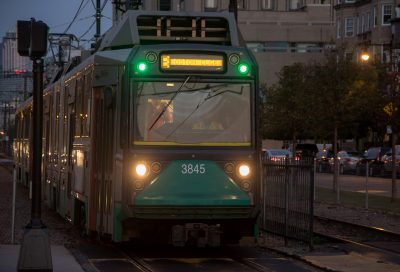
Bridj, a Boston-based shuttle transportation system, proposed a late-night public transportation service to the Massachusetts Bay Transportation Authority in October, according to its Monday proposal to the MBTA’s Fiscal and Management Control Board. The plan would operate in lieu of the MBTA’s recently cut late-night transportation service, the proposal stated.
The service would be administered through the Bridj app, where riders can share a vehicle with eight to 10 people, and fares would be determined by the MBTA, the proposal stated.
The app, according to the proposal, would function like ride-hailing services such as Uber and Lyft, in which a user would set a predetermined pick-up and drop-off spot to book their $2-$6 trip.
Anne Haynes, a Boston University city planning and urban affairs professor, said Bridj is a suitable complement to MBTA’s services, especially in expanding routes and hours of operation.
“Given that I think they use technology to figure out very efficient routes, it’s actually a great opportunity to see if there’s a way of delivering transportation services more efficiently, especially late-night,” Haynes said. “The MBTA needs to be creative with a low-budget, and Bridj certainly provides them with that kind of an option.”
The service would entail in-vehicle Wi-Fi and be, on average, 40 to 60 percent more efficient than public transportation, the proposal stated.
The proposal estimated an annual cost of $1.55 million, with the MBTA reimbursing the transportation company $85 on a vehicle every hour.
The MBTA terminated its Late-Night Service Pilot Program on March 18, The Daily Free Press reported.
Bridj has implemented a similar program in Kansas City, the proposal stated.
Bridj and the MBTA could not be reached for comment.
Eugene Benson, a city planning and urban affairs professor at BU, said curtailing the T’s service hours serves a disadvantage for people who have late-night activities.
“It harms people who are out late at night because they were partying or going to friends’ houses … definitely more importantly are the people who work those hours and have to get to and from work,” Benson said. “When the T says it doesn’t have enough money to run that service, they’re making a decision, and they’re weighing and deciding that those people who lose the service aren’t as important as the dollars that they allocate towards it.”
Several residents said they support Bridj’s potential partnership with the MBTA, and that the MBTA should resume its late-night services.
Harrison Freeman, 24, of Allston, said the MBTA has not been catering to the needs of late-night travelers.
“It seems to be pretty on point with how Boston deals with late-night generally unfavorably,” he said. “It wasn’t great late-night even before it got shut down, so I’m definitely not surprised by it. For a big city it’s pretty embarrassing, but that’s what Boston likes to do with its nightlife.”
Louis Garcia, 26, of Brighton, said although Bridj could be an option for replacing MBTA’s terminated late-night service, it would still need to find a solution to the vehicles’ limited seats.
“In a way its good, but at the same time it’s not because there are not enough seats. Also waiting for those cars to pick you up is going to be more time waiting, especially during winter, because nobody wants to wait outside during winter,” he said. “Waiting for one of those buses is not going to be convenient for everybody.”
Lauren Johnson, 24, of Brighton, said MBTA has not been reliable, and that she prefers ride-hailing services over public transportation.
“I had to deal with the bus today — I had to take the 501 Express and it didn’t stop for me. Anyway, I don’t think I really like it,” she said. “I can afford to pay for an Uber. But for some people who are relying on the T or buses to get home from work, if the cost of a Bridj is still two or three times the cost of the T or buses, it doesn’t help.”






















































































































